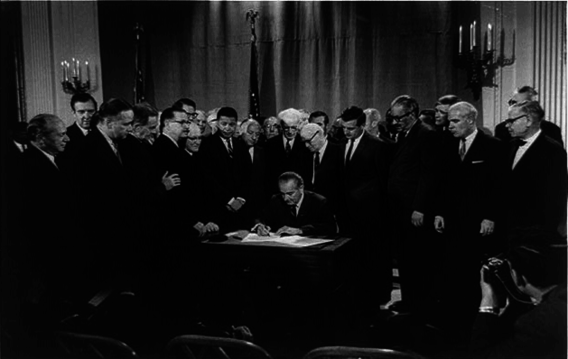
credit: U.S. News & World Report magazine collection, Prints & Photographs Division, Library of Congress
The Civil Rights Act of 1964—the most sweeping civil rights legislation in history—prohibited housing discrimination in any program that received federal assistance. However, the housing provision was rarely enforced. Moreover, it did not address discrimination in the sale or rental of privately owned housing.
Fair housing legislation was the most sensitive area of civil rights legislation. The legislation would ban all discrimination in housing and would open the door for minorities to move into white neighborhoods. Most of the Senate was afraid to touch such an explosive issue, but Senator Mondale agreed to carry the legislation forward. During the summer of 1967 hearings were held on his bill to enact housing equality. Despite powerful testimony ranging from the U.S. Attorney General to top legal experts to individuals who were denied freedom of choice in housing, the bill failed to leave the committee and receive consideration by the full Senate. However, the hearings established the case for housing equality and they were instrumental to the eventual success of fair housing legislation. The following year, Senator Mondale, with Senator Brooke (R-MA), sponsored the Fair Housing Act of 1968 as an amendment to the pending civil rights bill. He was a key player in its success.
Debate on fair housing was contentious and spirited. Opponents called the bill "obnoxious," "discrimination in reverse," and claimed that it was "robbing all Americans of their basic rights of private property." Proponents argued that fair housing was "morally right," "economically sound," "socially responsible," and "legally and constitutionally correct."[1] As the debate proceeded, it became clear that the cause was gaining bipartisan support among Northern senators, as well as the support of the nation. Yet, filibuster by the opposition continued to threaten success. In order to ensure passage of a fair housing law, Senators Mondale and Brooke eventually tabled their legislation to make way for slightly less comprehensive legislation introduced by Senator Everett Dirksen (R-IL). On March 11, 1968 the Senate passed H.R. 2516, the Civil Rights Act of 1968, which included far-reaching fair housing requirements. The bill was sent to the more conservative House of Representatives, where changes to weaken the bill were expected.
These changes never happened. The assassination of Dr. Martin Luther King, Jr. on April 4, 1968 resulted in a sense of urgency regarding civil rights. On April 5, Senator Mondale stood on the Senate floor and said, "The foremost proponent of a nonviolent confrontation between the races is dead. His generosity to the white man, his belief in the basic good will of all men, and his dramatic, nonviolent action enabled him to speak to both races. . . . We can pray today that the death of the nonviolent leader will not bring violence to life. In the days ahead, we must act to fulfill King's dream. . . . It is up to Congress today to lend powerful support to the argument of black moderates by immediately passing the 1968 civil rights bill, and by moving quickly to provide employment and housing opportunities for all blacks and whites."[2]
On April 10, 1968, in the midst of the country's grief following Dr. King's assassination, Congress passed the Civil Rights Act of 1968. The bill was signed into law by President Johnson on April 11, 1968. The law prohibits discrimination in the sale, rental, and financing of dwellings, based on race, color, religion, national origin, and, in later amendments, sex, familial status, and handicap.
Within an hour after President Johnson signed the bill into law, Senator Phil Hart (D-MI) scribbled a note to Senator Mondale: “You were magnificent—your energy, your counsel, your courage, and your leadership combined to move the Senate ‘to do right.’”[3]